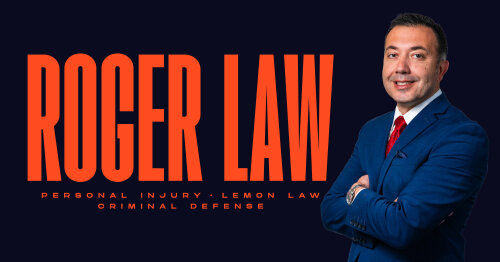Best Car Accident Lawyers in Texas
Share your needs with us, get contacted by law firms.
Free. Takes 2 min.
Or refine your search by selecting a city:
List of the best lawyers in Texas, United States
About Car Accident Law in Texas, United States
Car accident law in Texas falls within the broader area of personal injury law. Texas roads see thousands of accidents each year, making car accidents one of the most common reasons for personal injury claims. When a car accident occurs, Texas law establishes who is at fault, what damages can be claimed, and how compensation is awarded. The goal of car accident law is to ensure that victims receive the financial support needed for medical bills, property damage, lost wages, pain and suffering, and other consequences caused by someone else's negligence or reckless behavior.
Why You May Need a Lawyer
Navigating the aftermath of a car accident can be challenging, especially when injuries or significant property damage are involved. Here are some common situations where legal assistance can be crucial:
- Your injuries are severe, long-term, or have led to disability.
- Fault for the accident is disputed or unclear.
- The insurance company is denying your claim or offering a low settlement.
- Multiple parties are involved in the accident, complicating liability.
- The at-fault driver is uninsured or underinsured.
- You are being sued by another party involved in the accident.
- You must negotiate medical liens or other debts related to the accident.
In these situations, a knowledgeable lawyer can help you protect your rights, gather evidence, negotiate with insurance companies, and work to maximize your compensation.
Local Laws Overview
Understanding Texas-specific car accident laws is important for anyone involved in a collision. Here are key aspects to be aware of:
- Fault-Based System: Texas follows a "fault" system, meaning the person responsible for the accident is liable for the resulting damages.
- Comparative Negligence: Texas uses a modified comparative negligence rule, allowing accident victims to recover compensation if they are less than 51 percent at fault. However, your compensation is reduced by your degree of fault.
- Statute of Limitations: Generally, you have two years from the date of the accident to file a personal injury lawsuit.
- Insurance Requirements: Texas drivers must have minimum liability insurance coverage, which includes 30,000 dollars per injured person, 60,000 dollars per accident, and 25,000 dollars for property damage.
- Duties After a Crash: Texas law requires drivers to stop, exchange information, and render aid, if capable, after an accident. Failing to do so may result in criminal penalties.
Frequently Asked Questions
What should I do immediately after a car accident in Texas?
First, check for injuries and call 911 if needed. Move to a safe area if possible, exchange information with all involved drivers, gather witness information, take photos of the scene, and file a police report.
When am I required to report a car accident in Texas?
Texas law requires a report if the accident causes injury, death, or property damage estimated at 1,000 dollars or more. Reporting to local law enforcement or the Texas Department of Transportation is necessary.
How is fault determined in a Texas car accident?
Fault is established based on evidence such as police reports, witness statements, photos, and sometimes accident reconstruction. Insurance companies often conduct their own investigations.
Do I need to see a doctor even if I feel fine after the accident?
Yes. Some injuries may not show symptoms immediately. Medical records also serve as important evidence for claims.
Should I talk to the other party's insurance company?
It is generally best to speak with a lawyer before giving statements to the other party's insurer to avoid mistakenly harming your claim.
What types of damages can I recover after a car accident?
You may be eligible for compensation covering medical bills, lost income, vehicle repairs, pain and suffering, and other losses resulting from the accident.
What if I was partially at fault for the accident?
Under Texas comparative negligence law, you can still recover damages if you were less than 51 percent at fault, but your compensation will be reduced by your percentage of fault.
How long do I have to file a lawsuit after a car accident in Texas?
The statute of limitations is generally two years from the date of the accident for personal injury and property damage claims.
What if the at-fault driver does not have insurance?
You may be able to file a claim through your own uninsured or underinsured motorist (UM/UIM) coverage, if you have it on your policy.
Will hiring a lawyer cost me upfront?
Most Texas car accident lawyers work on a contingency fee basis, meaning you do not pay unless you win your case. Be sure to discuss fee arrangements during your initial consultation.
Additional Resources
Several organizations and agencies can provide information or assistance after a car accident in Texas:
- Texas Department of Insurance (TDI): Offers consumer information on auto insurance and the claims process.
- Texas Department of Transportation (TxDOT): Provides crash record information and driver responsibility guidelines.
- Office of the Texas Attorney General: Offers resources for victims and guidance on consumer rights.
- Local Police Departments: Can supply copies of accident reports and assist with reporting requirements.
- State Bar of Texas: Helps connect individuals with qualified attorneys in your area.
Next Steps
If you have been involved in a car accident in Texas and believe you may need legal assistance, start by gathering all relevant information, including medical records, police reports, photographs, and insurance correspondence. Reach out to a qualified car accident attorney to discuss the details of your case. Most lawyers offer free consultations to help you understand your options. Acting promptly can help protect your rights and improve the chances of a favorable outcome.
Remember, you do not have to navigate the aftermath of a car accident alone. Legal guidance can clarify your next steps, help you avoid common mistakes, and make the process less overwhelming.
Lawzana helps you find the best lawyers and law firms in Texas through a curated and pre-screened list of qualified legal professionals. Our platform offers rankings and detailed profiles of attorneys and law firms, allowing you to compare based on practice areas, including Car Accident, experience, and client feedback.
Each profile includes a description of the firm's areas of practice, client reviews, team members and partners, year of establishment, spoken languages, office locations, contact information, social media presence, and any published articles or resources. Most firms on our platform speak English and are experienced in both local and international legal matters.
Get a quote from top-rated law firms in Texas, United States — quickly, securely, and without unnecessary hassle.
Disclaimer:
The information provided on this page is for general informational purposes only and does not constitute legal advice. While we strive to ensure the accuracy and relevance of the content, legal information may change over time, and interpretations of the law can vary. You should always consult with a qualified legal professional for advice specific to your situation.
We disclaim all liability for actions taken or not taken based on the content of this page. If you believe any information is incorrect or outdated, please contact us, and we will review and update it where appropriate.
Browse car accident law firms by city in Texas
Refine your search by selecting a city.















